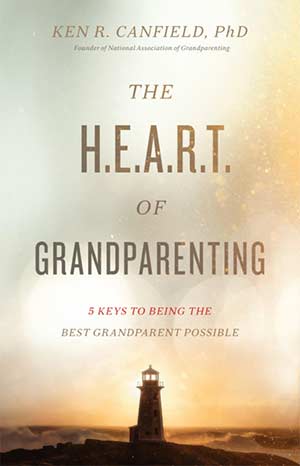by Dr. Ken Canfield
As a parent and grandparent, I’m big on open communication in our family and extended family. With our adult children and their spouses, it’s so easy for misunderstandings to creep in, which can then lead to confusion, hurt feelings, bitterness, and even estrangement. And most of us know that any amount of discord can get in the way of our opportunities and effectiveness as grandparents.

I encourage a proactive approach.
Ideally, these kinds of conversations are happening regularly; that’s the best way to prevent confusion, bitterness, and so on. But I realize none of us are perfect; we all have regrets and things in the past that we’d change if we could, and it’s likely there are conversations that should have happened long ago, but never did.
Here’s an example of how such a conversation might begin:
As I look back on my parenting, of course there are things I would do differently. I would have, for instance, done less of __________ and more of ___________. I was learning and growing all the time, and I know I was far from perfect. I also have some learning and growing to do as a grandparent, and I really want to. My goal is to become the best, most supportive grandparent I can be. I want to do anything I can to help you be a great parent. So count me as your team member, your cheerleader, and your biggest supporter. After all, we have something big in common: we both think your children are awesome!
That’s just an example, but let’s break it down a little and reinforce some key ideas:
First, have an attitude of humility throughout.
Acknowledging your shortcomings or limitations is an important step to show that you aren’t trying to “fix” them or force an agenda on them; your goal really is a better relationship, even if it means you need to grow in some ways. It isn’t easy to talk about past mistakes, but admitting them to our children is an important step in relationship building and, in some situations, reconciliation.
Second, express your unwavering support.
If you want them to be great parents for your grandchildren, do you encourage them in that role? Do you affirm them and offer to help when you can? Many grandparents are great at this, and if you aren’t, then this is a great way to commit to doing better. (And it might take time to show through your actions that you really mean it.) Ask your grandkids’ parents regularly: “How can I help?”
And third, stay humble and encouraging.
Yes, it’s worth repeating the two points above, because it won’t work to make those kinds of statements and then launch into a harsh criticism or complaint. Humility and support need to flavor all your interactions, especially during difficult discussions or disagreements.
And actually, if you can create a positive pattern in relating to your adult children, so that there’s a nearly constant atmosphere of acceptance and praise, I wouldn’t be surprised if that helps to minimize whatever difficult issues there may be in the relationship. When they feel loved and supported, they’re much less likely to take things personally or assume the worst.
I believe these are vital keys to maintaining harmony, and they could have unexpected positive results. They may, for instance, open more opportunities for us to be a grandparent.
What’s your secret? How do you maintain harmony in the extended family? Join the discussion on our Facebook page.
This was adapted from Dr. Ken Canfield’s book, The HEART of Grandparenting. Find out more and get your copy here.





